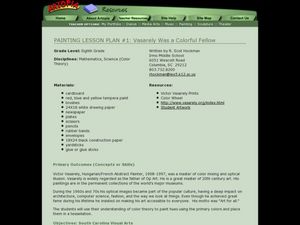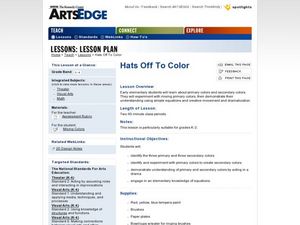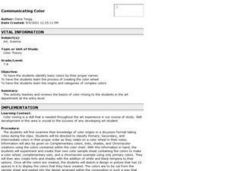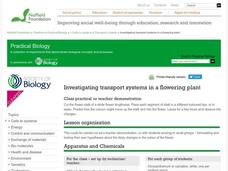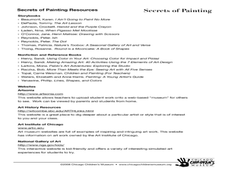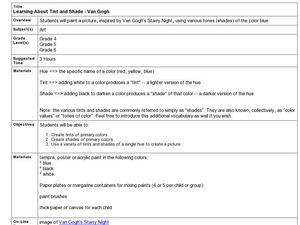Curated OER
Mixing Colors
Learners listen to a story about mixing colors. They explore color using cups of water, color and coffee filters. They use sight word vocabulary to describe the colors.
Curated OER
Mixing Colors
Fifth graders perform experiments with color mixing and color changing. They observe the differences between physical and chemical changes and record their observations in journals.
Curated OER
Colors: Primary and Secondary
Students explore primary and secondary colors. In this lesson on light and color, students complete four different activities which include mixing colors, creating secondary colors from primary colors and observing the colors in a bubble.
Houghton Mifflin Harcourt
Colors All Around: Challenge Activities (Theme 2)
Color, color, everywhere. As part of a three-week study of color, kindergarteners create animal color cards, design pages for an class animal book, populate an underwater scene with colorful fish, and invent and name a new color.
Houghton Mifflin Harcourt
Colors All Around: English Language Development Lessons (Theme 2)
A reading of the rhyme "Red Means Stop!" launches a three-week ELD/ESL study of color. The scripted daily lessons contained in the 32-page unit are packed with exercises, activities, and skill builders.
Curated OER
Vasarely Was A Colorful Fellow
Eighth graders create artwork inspired by the work of Victor Vasarely. In this op art lesson, 8th graders explore color theory and color mixing. Students create ten shapes to use in their artwork and over the course of two weeks,...
Curated OER
Hats Off to Color
Students investigate primary and secondary colors. In this art lesson, students mix primary paint colors to develop secondary colors. Students identify each color they created.
Curated OER
Communicating Color
Students identify basic colors by their proper names. They explain the process of creating the color wheel and explore the origins and catagories of complex colors.
American Museum of Natural History
See the Light
It's time to see the light! Scholars perform three different experiments with light to reveal properties using a great remote learning resource. The pupils see how light reflects from a surface and refracts through different materials....
Curated OER
Paper Clay Leaves
Using real leaves to imprint clay, your class will see a natural effect on their individual projects. This is a fabulous way to study leaf anatomy in science. Or, you can focus on mixing colors to recreate the original. These leaves can...
Nuffield Foundation
Investigating Transport Systems in a Flowering Plant
Some weddings have flowers in a unique, unnatural color to match the theme. Young scientists take part in this process to learn about the function of the xylem as they observe colored water moving through a flower. Then, they experiment...
Manitoba Education and Early Childhood Learning
A Foundation for Implementation
Color is the focus of this amazing resource packed with math, social studies, science, and language arts activities. Kids create a color word wall and post symbols, graph the number of objects they find of each color while on a treasure...
Curated OER
The Mixed Up Chameleon
Students read the story The Mixed Up Chameleon and complete discussions questions as they read the story. In this comprehension lesson plan, students also draw animals, list animals, and create a class book.
Curated OER
The Color of Your Own
Students understand primary and secondary colors. For this lesson about colors, students explore where colors come from. Students paint a picture with the primary paint colors that the teacher has created. Students mix the primary paint...
Curated OER
Secrets of Painting
Students explore colors and shapes. In this art concepts lesson, students discuss shapes, lines, and color while creating a variety of abstract designs. The instructions for several art activities are provided. Basic art vocabulary and a...
Curated OER
Learning about Tint and Shade- Van Gogh
Students explore tint, hues, and shades of color. In this art and color lesson, students observe and discuss Van Gogh's artistic style. Students mix paints to create a single hue background and add details to paint a nightscape of...
Curated OER
Piecing it Together: Adding & Subtracting Fractions
Students add and subtract fractions and mixed numbers with unlike denominators. They "fish" for and solve a number of fraction problems requiring adding, subtracting, finding equivalent fractions, and using mixed numbers.
Curated OER
Play Doh Color Wheel
Students identify primary and secondary colors, and construct color wheels, using Play Doh in the three primary colors.
Curated OER
What is It? Susie Sees!
Students explore the five senses. In this cross curriculum five senses lesson, students view an "I Can See Colors" PowerPoint presentation and sort items by color and shape. Students mix primary color paints to create secondary colors,...
Curated OER
Exploring Neighborhoods through Art
Students explore neighborhoods. In this color and social studies cross-curriculum lesson, students listen to Harold and the Purple Crayon by Crockett Johnson, then compare and contrast neighborhoods. Students mix primary colors to make...
Curated OER
Miriam Schapiro Action Figures Collage
Students create a background with a marbling technique. They plan and create a figure from assorted papers, mixing solids and patterns. Students glue the figure to the background, and embellish negative space with glitter.
Curated OER
The Magic School Bus Makes a Rainbow
Young scholars learn along with Ms. Frizzle's class. In this Magic School Bus lesson plan, students spin separate colors into a new color just as the Magic School Bus kids did.
Curated OER
Let There Be Light
Students explore the relationship between light and color. They explore the NineColours computer program, blend colors, create a slideshow of hues of colors, and conduct an experiment using a flashlight and colored cellophane.
Curated OER
How Do The Colors of Light Mix?
High schoolers investigate the mixing of light. They form a hypotheses to reason why color changes occur and they write conclusions and ask new questions arising from the investigation. Students identify the primary and complementary...







